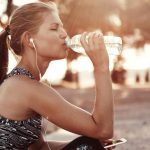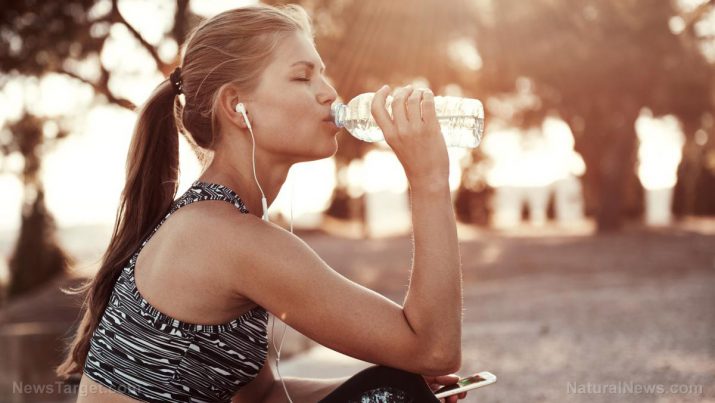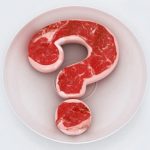
Study finds that sports drinks are NOT as helpful to athletes as initially thought
Wednesday, June 29, 2022 by Zoey Sky
http://www.products.news/2022-06-29-sports-drinks-not-helpful-to-athletes.html

Young kids, gym buffs and endurance athletes often try to replenish their electrolytes with sports drinks after taking part in strenuous physical activities. But a study suggests that sports drinks might not be as helpful to athletes as initially thought.
Sport drinks are often used to replenish electrolytes such as sodium after people sweat them out. Athletes rely on them to prevent electrolyte imbalances and dizziness after grueling workouts. But the ability of these beverages to prevent illness and improve performance has yet to be proven.
While sports drinks are often taken to ensure that sodium levels never dip too low, spiking those levels too high can be just as dangerous.
For the study, the researchers focused on both extremes of electrolyte imbalance. Hypernatremia occurs because of a rise in sodium levels linked to dehydration. The condition can cause dizziness and vomiting.
Meanwhile, exercise-associated hyponatremia (EAH) is caused by a drop in sodium levels from drinking too much water while working out. EAH can cause altered mental states, seizures and other health problems.
Most athletes worry about dehydration even though it’s not fatal, but recent findings suggest that dehydration is not as dangerous as overhydration.
How to maintain electrolyte balance
The study results showed that sports drinks don’t do much to protect athletes from health conditions like EAH or other illnesses. (Related: Better than sports drinks: Prevent dehydration with these 20 electrolyte-rich foods.)
The research team studied data from 266 ultramarathoners, or those who run 155 miles through extreme weather and environmental conditions, within seven days.
On the last day, they took blood samples to examine the sodium levels of the volunteers. Results revealed that 41 athletes had sodium imbalances. Eleven of the athletes had EAH or too little sodium while 30 were dehydrated because of too much sodium.
Overhydrating can reduce electrolyte levels, and electrolytes from sports drinks won’t do much for you, advised Lipman.
Instead of drinking sports drinks with electrolytes to prevent imbalance, the researchers said it is better to attain a healthy electrolyte balance through training for longer distances, maintaining a lower body mass and avoiding overhydration.
Because 98 participants ran in temperatures averaging 93 F and 88 percent of the sodium imbalances occurred during hot races, Lipman warned that athletes have to be responsible while exercising, “especially in the heat when you are sweating more and have greater hydration requirements.”
Lipman concluded that the best way to weigh in on your health during extreme sports like ultramarathoning is by listening to your body. Drink when you are thirsty and stop drinking if you are already feeling bloated or nauseous.
Aside from drinking water, the following foods can help you maintain electrolyte balance:
- Almonds
- Avocados
- Bananas
- Beans
- Broccoli
- Buttermilk
- Canned foods, such as soups and vegetables
- Chicken
- Fish, such as flounder
- Kale
- Milk
- Olives
- Oranges
- Peanuts
- Potatoes
- Raisins
- Soybeans
- Spinach
- Strawberries
- Tofu
- Tomatoes
- Turkey
- Veal
- Watermelon
- Yogurt
Exercise regularly and hydrate when you are thirsty to prevent electrolyte imbalance when working out.
Watch this video about healthy electrolytes.
This video is from the Cheri and Timothy McGaffin II channel on Brighteon.com.
More related stories:
Organic Coconut Water: Mother Nature’s best energy drink.
Sources include:
Tagged Under: Tags: badfood, badhealth, badscience, dehydration, electrolytes, fitness, food science, grocery, health science, junk food, men's health, nutrients, products, research, sports drinks, truth, women's health
RECENT ARTICLES


Great Reset food goal: Feed the world with artificial lab-grown meat
By Belle Carter

Graphene-laced face masks raise health concerns
By Kevin Hughes

Globalist-backed lab-grown meat uses byproduct of cow slaughter
By Ramon Tomey

Lab-cultured, GMO-laden fake “meat” is a toxic abomination to be avoided at all costs
By Ethan Huff
COPYRIGHT © 2017 PRODUCTS NEWS


